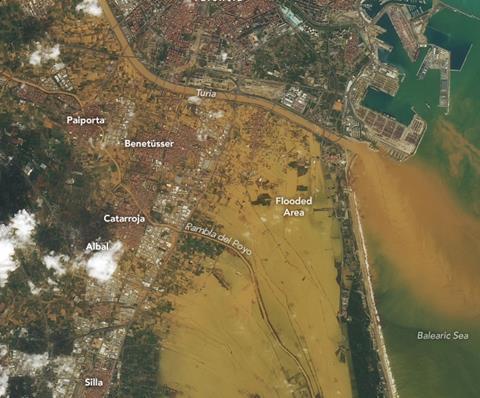Devastating flooding in Valencia, Spain last week has hit automotive production in the region, with tier one supplier plants affected and a significant impact on logistics. Warehouses and distribution centres on industrial estates have been flooded which is affecting the supply chain. The extreme weather has also disrupted rail and road links in the region.
The flooding and landslides, which have killed more than 200 people, resulted from the equivalent of one year’s worth of rain falling in just eight hours in Valencia and surrounding areas on Tuesday (October 29). The Andalusia region has also been affected. Locally the flash floods, hail and tornadoes are referred to as Dana, a Spanish acronym that refers to a high-altitude isolated depression (depresión aislada en niveles altos).

Ford confirmed that its operations at the Almussafes plant were closed on October 30-31 though there was no direct damage to the plant from the floods.
A spokesperson for Ford said around 500 workers at the Ford Almussafes plant spent the first night in the factory because the heavy rain prevented buses from reaching the plant.
The team at Almussafes is currently evaluating the full impact on suppliers and the status of the connecting infrastructure, including road and rail links, according to Ford’s spokesperson.
The plant will remain closed until November 11 because of the bank holiday on November 1 and the planned shutdown for the following week because of the Temporary Employment Regulation File (ERTE) in force at Almussafes. The ERTE is a measure being taken by Ford for the regulation of employment until the end of the year. Ford has negotiated programmed shut-down days with the union because production capacity is currently higher than demand. Ford is going to introduce a new model for assembly at the plant in 2027.
Ford’s spokesperson said it would have a clearer picture of the impact on the supply chain when the plant reopened.
The Spanish Association of Automotive Suppliers (SernAuto) issued a statement of condolence for the life lost in the storm and flooding. It added that many automotive supplier factories and facilities have been affected by the storm, with the corresponding impact on workers, their families and the competitiveness of businesses.
Land and port logistics
In terms of road infrastructure, the A-3 and A-7 motorways have been affected in several sections causing serious disruption to traffic. The collapse of the overhead line on the A-7 Mediterranean motorway has affected long-distance traffic on the Mediterranean axis. More than 77,000 vehicles use the motorway every day, of which 25% are heavy vehicles. In addition, 5,000 trucks move in and out of the port of Valencia every day using the road. Spain’s General Directorate of Traffic (GDT) has issued a resolution of extraordinary traffic management that includes a ban on vehicles more than 7,500kg (loaded or not) that are not destined for Valencia. Restrictions are being put in place at midnight on November 4.
The Ministry of Transport and Sustainable Mobility has declared a state of emergency and allocated around €24.8m ($27m) euros to begin rebuilding the roads most severely damaged by the flooding and landslides in the provinces of Valencia and Cuenca: the A-7, the N-330 and the N-322. It said work is to begin imminently on these roads of strategic importance for the State Road Network. Specifically, €12.6m have been allocated on an emergency basis to rebuild the collapsed A-7 overhead section.
The remaining €12.2m euros allocated are intended for the reconstruction of the N-322 highway near Requena, and of the N-330 in different sections throughout the provinces of Valencia and Cuenca, seriously damaged by the heavy rainfall.
Rail services between Valencia, Madrid and Barcelona have also been affected by damage to tracks and overhead lines.
The port authority of Valencia said that operations at the CSP, MSCT and APM terminals had resumed and the reception and delivery of goods and both Valencia and Sagunto ports were operational on October 30.


























![Global[1]](https://d3n5uof8vony13.cloudfront.net/Pictures/web/a/d/s/global1_726550.svgz)













No comments yet